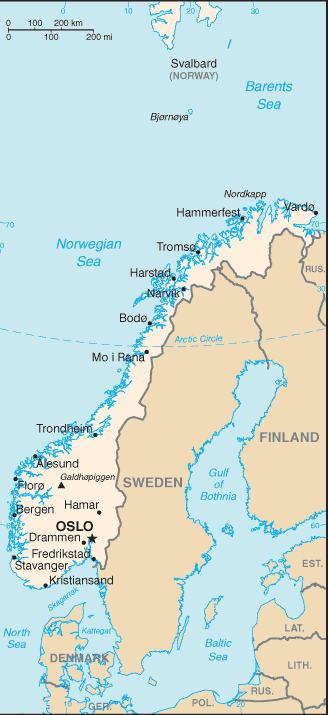Norway
The Kingdom of Norway is a Nordic country on the western portion of the Scandinavian Peninsula, bordering Sweden, Finland and Russia, with territorial waters bordering Danish and British waters. It has a very elongated form and has an extensive coastline along the North Atlantic Ocean, where Norway's famous fjords are found. The nearby island territories of Svalbard and Jan Mayen are under Norwegian sovereignty and are considered as part of Norway as a kingdom, while Bouvet Island in the South Atlantic Ocean and Peter I Island in the South Pacific Ocean are Norwegian dependencies, which are not considered part of the kingdom. Additionally, Norway has a claim for Dronning Maud Land in Antarctica. In the 9th century Norway consisted of a number of small kingdoms. Harald Fairhair gathered the small kingdoms into one and in 872 with the battle of Hafrsfjord, he had established the country as one unit. The Viking age (8th to 11th centuries) was one of national unification and expansion. The Norwegian royal line died out in 1387, and the country entered a long period as the weaker part of a union with Denmark. With the forced introduction of Protestantism in 1537, Norway lost the steady stream of pilgrims to the relics of Saint Olav at the Nidaros shrine. With them, ironically, went much of the contact with the cultural and economical life of the rest of Europe. In light of national romanticism during the 19th century, this period was by some called the "400-year night". After Denmark-Norway sided with Napoleon in the Napoleonic Wars, Norway was ceded to the king of Sweden in 1814. However, Norway declared her independence, adopted her own constitution and elected the Danish prince Christian Fredrik as king on 17 May 1814. Norway was forced into a personal union with Sweden, but kept its liberal constitution and independent institutions, except for the foreign service. Growing Norwegian dissatisfaction with the union during the late 19th century spawned its dissolution 7 June 1905. The Norwegian government offered the throne of Norway to Danish Prince Carl. After a plebiscite confirming the monarchy, the Parliament unanimously elected him king. He took the name of Haakon VII, after the medieval kings of independent Norway. Norway was a neutral country during World War I. Norway also attempted to claim neutrality during World War II, but was invaded by German forces on the 9th of April 1940 (Operation Weserübung). The Allies also had plans to operate from Norway, in order to take advantage of her strategically important Atlantic coast. Armed resistance in Norway went on for two months, but the King and government continued the fight from exile in Britain. On the day of the invasion, the collaborative leader of the small National-Socialist party Nasjonal Samling – Vidkun Quisling – tried to seize power, but was forced by the German occupiers to step aside. Real power was wielded by the leader of the German occupation authority, Reichskommissar Josef Terboven. Quisling, as minister president, later formed a government under German control. In 1944, the Germans evacuated the provinces of Finnmark and northern Troms, using a scorched earth tactic. The Red Army moved in shortly after, and peacefully returned the area to Norwegian control after the war, despite President Roosevelt having offered them parts of northern Norway. The Germans in Norway surrendered on 8 May 1945. The occupation during World War II made Norwegians generally more skeptical of the concept of neutrality. They turned instead to collective security. Norway was one of the signatories of the North Atlantic Treaty in 1949 and was a founding member of the United Nations, providing its first secretary general – Trygve Lie. Norway has twice voted against joining the European Union (in 1972 and 1994), but is associated with the EU via the European Economic Area.
This article is licensed under the GNU Free Documentation License. It uses material from the Wikipedia article "Norway".
|
||||||||||||

